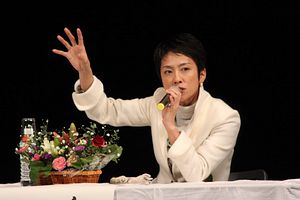On September 15, Japan’s Democratic Party (DP, Minshin-to) elected Renho Murata, who had been serving as acting leader, president of the party. Renho won a landslide victory against two other contenders, former party leader Seiji Maehara and Yuichiro Tamaki.
Her election is a telltale sign of the DP’s desperation for party renewal. With the party’s approval rate hovering below 10 percent, it is clear that those who supported Renho, particularly over Maehara, felt strongly that a clean break from the party’s past is necessary to start winning back the public’s confidence.
Indeed, the presidential election could have served as the opportunity to recast the DP as a party willing to and capable of governing, if given the chance by voters. While Prime Minister Shinzo Abe continues to enjoy solid support from the public with favorable approval ratings (the most recent opinion poll conducted by NHK, the Japan Broadcasting Corporation, shows his approval rating at 57 percent), a more detailed look at these polls suggests that his seeming popularity may not be because of the successes of his policies.
In fact, however, the majority of voters are critical of his government’s policies on key domestic issues. A poll conducted by FNN News in the summer of 2016 found that 55 percent of respondents were critical of Abe’s economic policy, while 57 percent were critical of his social security policy. However, the poll results on which political party the voters support are particularly revealing. In the FNN News opinion poll, approximately 40 percent of respondents supported Abe’s Liberal Democratic Party (LDP); with the support for coalition partner Komeito holding steady more or less at 5 percent, this brings up the approval rating of the ruling coalition to approximately 45 percent. In a stark contrast, the DP’s support rate is a mere 9.9 percent, while over 32 percent of those surveyed say they do not support any particular political party. Put simply, the Abe government seems strong not because of his own strength, but rather because of the weakness of his opponents.
Thus, the recent DP party presidential election was important in gauging whether the party, under its new president, can position itself to call greater attention to the Abe’s weakness—the voters’ frustration with his rather lackluster domestic policies—and offer an alternative vision for the country. As Japan continues to find itself in the environment that imposes more diverse but nonetheless serious security challenges, how should the government make an investment that keeps its people and country safe, while ensuring the health of the economy in a rapidly aging society? How can the government move beyond catchy but ambiguous slogans such as “the society where women can shine” or “the society where each of the 100 million population can maximize their potential” and have more meaningful discussions on, for example, the comprehensive reform of tax and social security? These are the issues that could have been featured in the DP presidential election.
However, the only issue that was actively discussed in the campaign was whether Renho, who has a Taiwanese father and Japanese mother, carries dual citizenship. Given that Japan does not recognize Taiwan as a country, ensuring that a person has forsaken Taiwanese citizenship is a complicated legal issue. Renho did not help by first outright denying that she had a dual citizenship, only to reverse her position later in the DP presidential election. Still, it does not change the reality that the leadership election of a political party that aspires to be a serious alternative to the ruling LDP-Komeito coalition essentially revolved around the nationality of one of the candidates.
Even worse is Renho’s inability to fill the key DP leadership post following the election. In particular, when she suggested that former Prime Minister Yoshihiko Noda be the party’s secretary general under her leadership, some members openly voiced their opposition. Noda is regarded by many in the party as the leader responsible for bringing down the then Democratic Party of Japan (DPJ) government in December 2012 by taking on the unpopular issue of raising the consumption tax. While such criticism is understandable, how quickly the DPJ lost public support in the following four years speaks to larger problems in its inability to govern with discipline. Renho being prevented from filling the party leadership position after her landslide victory in the election strongly suggests that many of DP’s own members continue to instinctively blame others rather than reflecting on their own failures and learning from them.
A poll conducted by Kyodo News immediately following the election shows that the public is largely positive toward Renho’s selection as the DP president, with 56 percent of the respondents saying they have positive expectations for what she can do to turn the party around. But with many of DP’s members seeming oblivious to the real cause of their ultimate failure as a governing party, Renho has very little to work with.

































